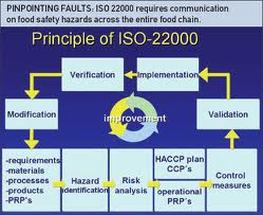|
ISO 22000This International Standard ISO 22000 specifies requirements for a food safety management system where an organization in the food chain needs to demonstrate its ability to control food safety hazards in order to ensure that food is safe at the time of human consumption.
It is applicable to all organizations, regardless of size, which are involved in any aspect of the food chain and want to implement systems that consistently provide safe products. The means of meeting any requirements of this International Standard can be accomplished through the use of internal and/or external resources. This International Standard ISO 22000 specifies requirements to enable an organization · To plan, implement, operate, maintain and update a food safety management system aimed at providing products that, according to their intended use, are safe for the consumer · To demonstrate compliance with applicable statutory and regulatory food safety requirements · To evaluate and assess customer requirements and demonstrate conformity with those mutually agreed customer requirements that relate to food safety, in order to enhance customer satisfaction · To effectively communicate food safety issues to their suppliers, customers and relevant interested parties in the food chain · To ensure that the organization conforms to its stated food safety policy · To demonstrate such conformity to relevant interested parties and · To seek certification or registration of its food safety management system by an external organization, or make a self-assessment or self-declaration of conformity to this International Standard. All requirements of this International Standard (ISO 22000) are generic and are intended to be applicable to all organizations in the food chain regardless of size and complexity. This includes organizations directly or indirectly involved in one or more steps of the food chain. Organizations that are directly involved include, but are not limited to, feed producers, harvesters, farmers, producers of ingredients, food manufacturers, retailers, food services, catering services, organizations providing cleaning and sanitation services, transportation, storage and distribution services. Other organizations that are indirectly involved include, but are not limited to, suppliers of equipment, cleaning and sanitizing agents, packaging material, and other food contact materials. This International Standard allows an organization, such as a small and/or less developed organization (e.g. a small farm, a small packer-distributor, a small retail or food service outlet), to implement an externally developed combination of control measures. |


